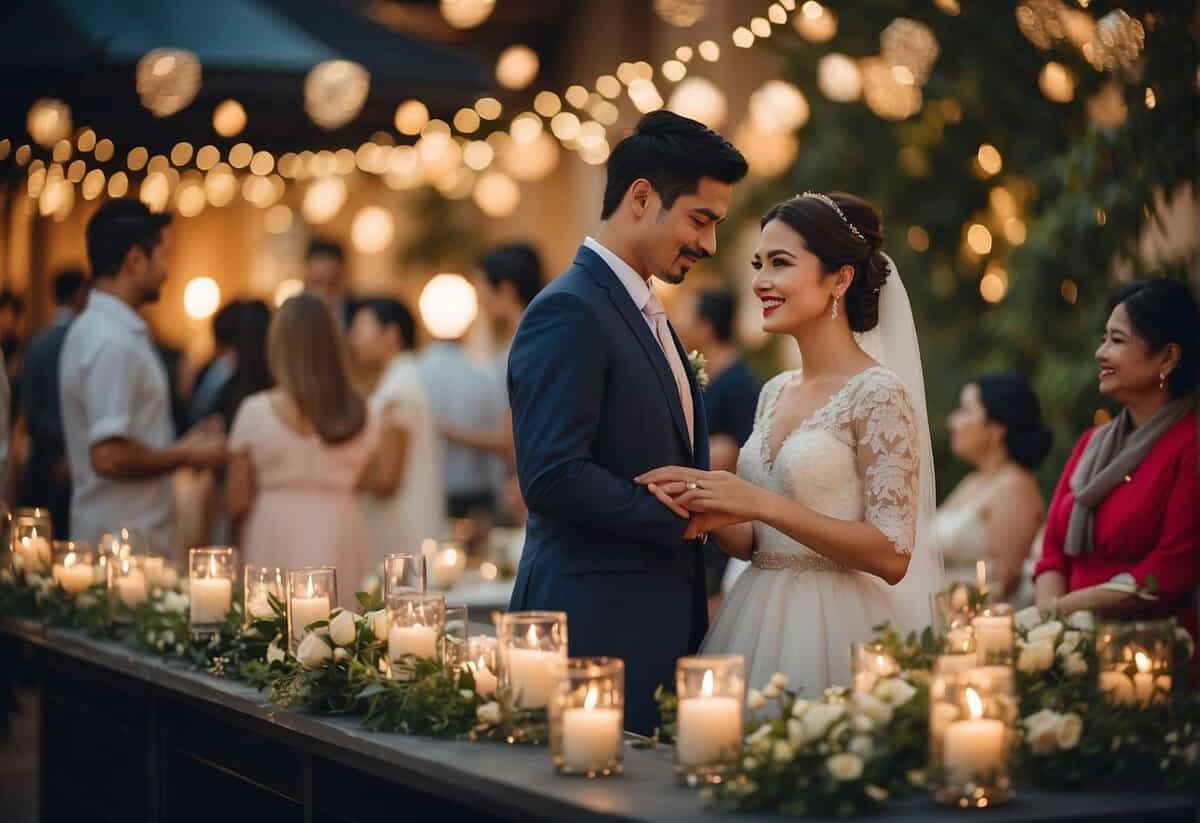Do Guests Pay for Weddings? Understanding the Etiquette of Wedding Expenses
When it comes to the question of “Do guests pay for weddings?”, it’s all about understanding the financial etiquette and expectations involved. Wedding costs can be significant, and traditionally the bride’s and groom’s families have shouldered the bulk of these expenses. However, there is a variety of ways in which costs can be distributed, and practices can vary widely depending on cultural norms, the couple’s preferences, and individual circumstances.

In most cases, guests are not expected to pay for the wedding itself, but there are associated costs that they may need to cover, such as travel and accommodations, especially for destination weddings. The wedding party may have specific roles and financial responsibilities, such as the bridesmaids and groomsmen covering their attire and hosting certain pre-wedding events. Clear communication about who pays for what can help avoid misunderstandings and ensure that the celebration remains joyful for everyone involved.
Key Takeaways
- Guests usually cover their travel and attire costs, not wedding expenses.
- The wedding party often has distinct financial roles and duties.
- Open communication regarding financial expectations is crucial.
Understanding Wedding Expenses

Navigating the financial landscape of a wedding can be complex, but understanding who is responsible for each aspect of the costs can help you plan accordingly.
Who Pays for What
Traditionally, the bride’s family and the groom’s family would split wedding costs in specific ways. However, times have changed, and it’s become more common for the couple to contribute significantly to their wedding expenses. Some couples even opt to cover all costs to maintain full control over their event.
Budgeting for the Wedding
Setting a wedding budget is critical. Start by determining the total amount you can spend, then allocate funds to different aspects of the wedding. Remember, unexpected expenses may arise, so it’s wise to have a financial cushion in place.
Venue and Catering Costs
The venue and catering are among the most significant expenses. These costs vary widely depending on location, guest count, and menu choices. Alcohol can also add a considerable amount to your catering bill. The reception typically accounts for 42 percent of a couple’s wedding budget.
Attire and Beauty
Your attire and beauty costs will include not just your wedding dress and any accessories, but also hair and makeup. Grooms generally handle the cost of their attire. Couples now pay for close to half of these expenses, including what they wear on their big day.
Pre-Wedding Events
Pre-wedding events like the bridal shower, bachelor/bachelorette parties, and the rehearsal dinner introduce additional costs. Traditionally, the groom’s family might pay for rehearsal dinners, while friends of the bride and groom often cover the bachelor/bachelorette parties. The engagement party can be hosted and financed by either family or the couple themselves.
Roles of the Wedding Party

The members of your wedding party play pivotal roles, offering support and fulfilling essential duties throughout your celebration. Let’s dive into the specific expectations and responsibilities they typically carry.
Expectations of the Bridal Party
The bridal party, including the bridesmaids, assumes a range of duties from providing moral support to being involved in event planning. You can count on your bridesmaids to:
- Help with choosing your wedding attire and hosting pre-wedding events such as bridal showers.
- Assist with managing the wedding registry and guiding guests on gift selection.
Responsibilities of the Groomsmen
Groomsmen have their set of responsibilities, which often mirror those of the bridesmaids, with their own distinct touch:
- Stand as support for the groom, organize the bachelor party, and ensure groomsmen attire complies with the wedding theme.
- Aid in coordinating transportation for the wedding day and assist with last-minute tasks.
Financial Contributions from the Party
Members of your wedding party often contribute financially to the celebrations. Their contributions may include:
- Participation costs like travel expenses, attire, and gifts. Typically, they purchase their outfits and may chip in for joint events like bachelor or bachelorette parties.
- Bridal party members also commonly give a gift, either individually or as a group, from your registry.
Members of the wedding party contribute to the joy and smooth operation of your wedding, with their involvement being a key element of the occasion.
Destination Wedding Considerations

When planning a destination wedding, it’s essential to navigate the intricacies of travel and accommodation, as well as effectively managing your budget.
Travel and Accommodation Logistics
Travel: As you plan your destination wedding, it’s common for guests to cover their own flights and transportation to the venue. However, you can assist by negotiating discounts with airlines or setting up shuttle services from the airport to the resort. Providing a list of recommended hotel rooms or securing room blocks at a nearby hotel can significantly ease their planning burden.
Accommodations: Aim to reserve rooms blocks at a local hotel or resort to ensure your guests have access to convenient and discounted lodging options. Working with a wedding planner who’s experienced in destination weddings can be invaluable in coordinating these details and may even secure better rates.
Managing the Cost of a Destination Wedding
Creating a comprehensive budget is a crucial step in managing the cost of your destination wedding. Factor in the primary wedding expenses like venue, food, and entertainment, along with the added costs of travel and accommodations.
- Strategies to Consider:
- Offer to pay a portion of accommodations for guests as a gesture of goodwill, if your budget allows.
- Seek wedding packages from the resort that can bundle services for a better rate.
- Look into off-peak season discounts for both the venue and travel.
By considering the logistics of both travel and cost, you can help ensure your destination wedding is accessible and enjoyable for you and your guests.
Post-Wedding Arrangements

After the celebration winds down, two primary concerns await your attention: planning your honeymoon and expressing gratitude to your guests. Getting these details right ensures that the joy of your wedding extends beyond the big day itself.
Honeymoon Planning
Your honeymoon is a significant event that marks the beginning of your married life. Start by checking that your marriage license is in order, as some destinations may require proof of marriage for check-in or special couples’ services. When considering your budget, remember that your wedding gifts may include monetary contributions towards your honeymoon fund, especially if you have set up a registry with this option.
- Destination: Choose a place that both you and your partner will enjoy.
- Travel: Look for deals and packages to keep costs manageable, including flights and accommodations.
- Officiant: If you’ve built a rapport, consider sending a postcard or a special thank you from your honeymoon destination.
Thank You Notes and Gift Acknowledgements
Acknowledging your guests’ generosity is a must. Aim to send thank you notes within two to three months after the wedding.
- Wedding Gifts: Personalize your gratitude with a mention of the specific gift or experience given.
- Registry: If guests purchased gifts from a registry, verify that all items have been accurately received and accounted for.
- Favors: Mention any wedding favors they took home, expressing hope that these tokens remind them of the fun shared.
Remember, these gestures of appreciation go a long way in honoring the relationships with those who celebrated your union.
Frequently Asked Questions

Navigating the financial aspects of wedding celebrations can be tricky. Here’s your quick guide to understanding the etiquette and options for managing costs as a guest or host.
What is the etiquette for guests contributing to the cost of the wedding meal?
Traditionally, guests are not expected to pay for their meal at a wedding. The costs are usually covered by the hosts, which could be the couple, their families, or a combination.
How can you word your invitations to indicate guests will pay for their own meal?
To convey that guests will be paying for their own meals, you might include a polite note in the invitation saying something like, “We invite you to join us for dinner, with each guest’s meal paid for individually.”
Can you ask your wedding guests to cover their own meal expenses?
While it’s not standard practice, you can ask your guests to cover their own meal expenses, provided it is communicated clearly and considerately in advance.
Who traditionally covers the cost of a wedding?
Typically, the bride’s family has been responsible for most wedding expenses, with the groom’s family covering the rehearsal dinner. However, modern weddings often see costs shared between both families and the couple themselves.
Is it considered acceptable to have a wedding where guests pay for their own attendance?
Having a wedding where guests pay for their own attendance is atypical and can be seen as a breach of traditional etiquette, but it may be acceptable in certain circumstances with transparent communication.
How do you communicate a ‘pay your own way’ approach for event meals in a friendly manner?
To communicate a ‘pay your own way’ approach, use cordial and respectful language, and ensure guests understand this arrangement is to ease financial pressures, allowing for a shared experience without the traditional expense.

